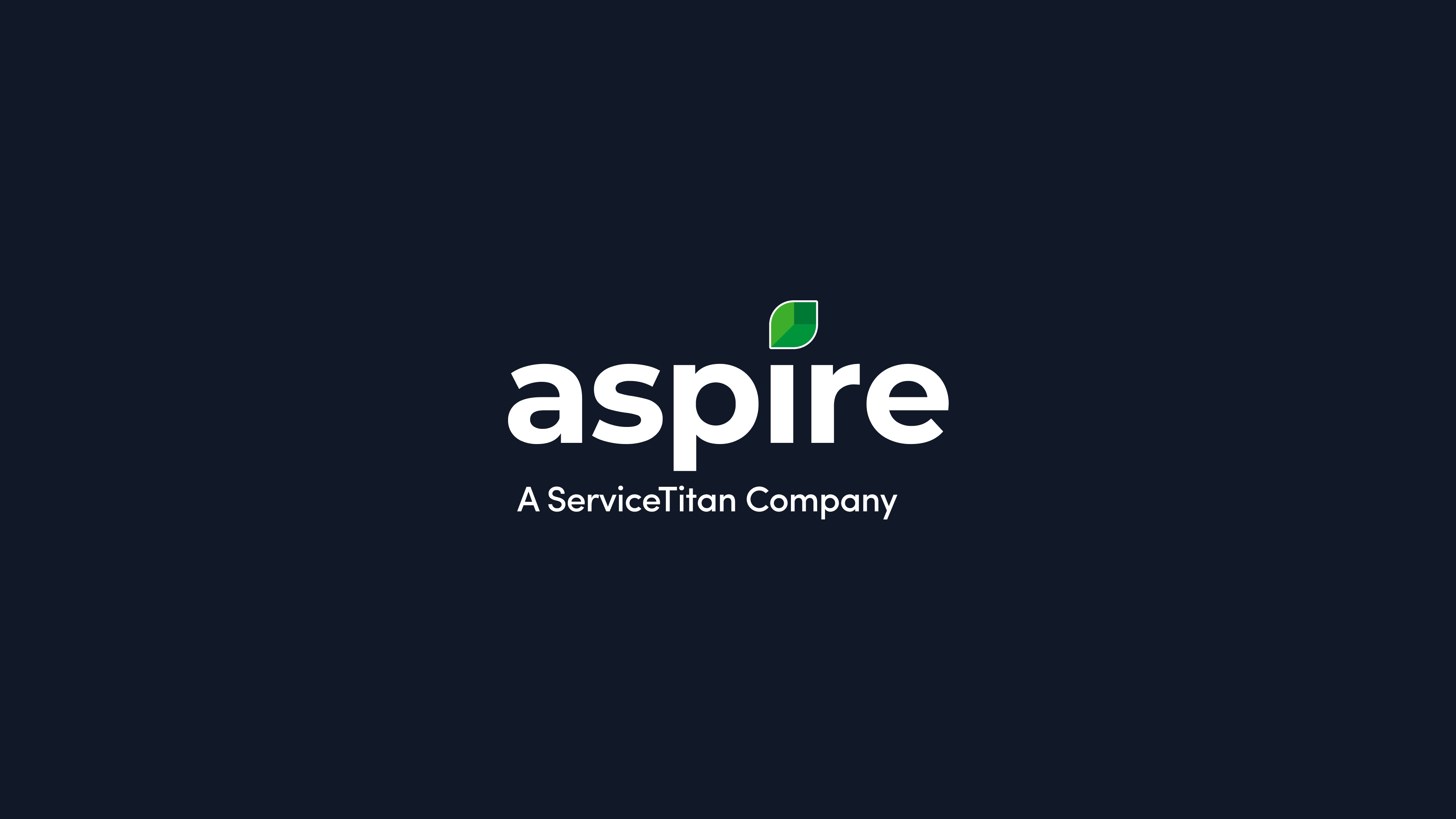Table of Contents
Table of Contents
Cleaning businesses use subcontractors as a flexible way to meet client demand, expand services, and scale. Business owners can streamline the outsourcing process by outlining essential requirements to ensure top-quality service to their clients.
A subcontractor agreement legally protects a cleaning business and its clients by specifying the scope of work and potential dispute resolution.
Cover all your bases with a comprehensive template if you use subcontracted janitors to assist in cleaning jobs or specialized cleaning tasks. Learn more about cleaning subcontractor agreement elements and best practices below.
What are the benefits of a subcontractor agreement?
A detailed janitorial subcontractor agreement is the first step to establishing and maintaining strong subcontractor partnerships.
A subcontractor services agreement in the cleaning industry benefits both parties by:
Clearly defining subcontractor tasks and responsibilities.
Specifying subcontractor requirements, such as a general liability insurance policy and licenses, which protect your company and clients.
Establishing payment terms so the subcontractor knows how much and when they will be paid.
Providing legal protection to the independent contractor if their subcontractor fails to perform duties within a reasonable time or disputes arise from their work.
Whether you use a template or enlist the help of a law firm, a subcontractor contract is a legal document and should incorporate the following elements.
What should a subcontractor agreement include?
The contents of a subcontractor agreement vary depending on the type of cleaning job or the business process of the commercial cleaning company.
Critical elements of a janitorial services subcontractor agreement include:
Parties: Identify the company—or contractor—and the subcontractor—or service provider—and their contact information.
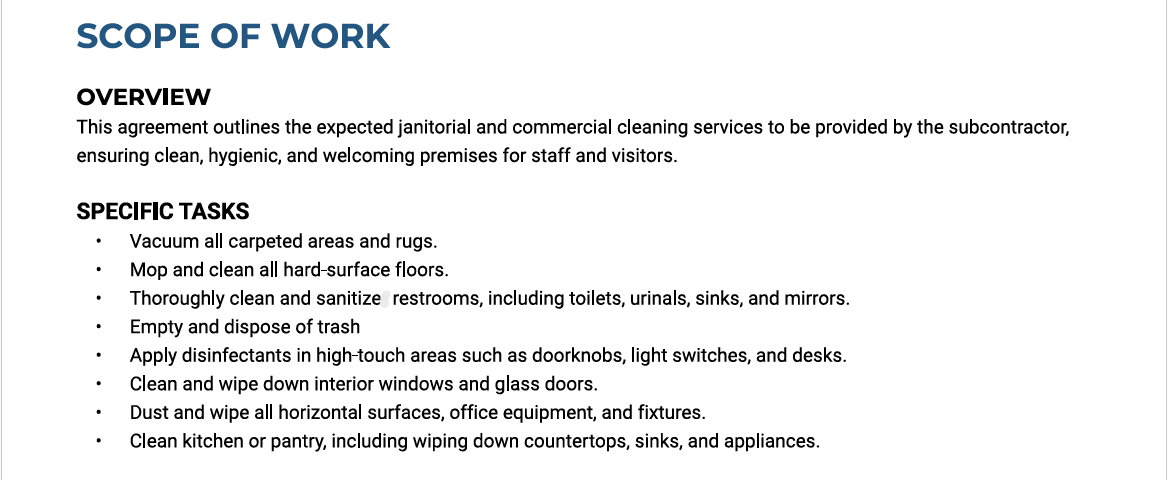
Scope of work: Detail specific cleaning tasks and responsibilities. Failure to delve into the specifics could result in defective performance and dissatisfied clients.
Compensation: Specify payment terms, including rates, payment methods, and due dates. Include information about mileage compensation.
Duration: Identify the agreement’s effective date, duration, and renewal conditions, as well as the process for termination. It’s essential to clearly state the duration so subcontractors complete the job on time.
Indemnification and legal clauses: An indemnification clause holds the subcontractor liable for property damage or injury resulting from faulty work. Other legal provisions include confidentiality and non-compete clauses.
Signatures: After reading the entire agreement, both parties must sign and date it.
An independent contractor agreement must include the details of the cleaning job and compensation process while specifying appropriate legal protections for both parties.
What are the legal considerations to consider when drafting a cleaning subcontracting agreement?
Legal terms and conditions may sound overwhelming, but they’re essential to a solid subcontracting agreement for janitorial work.
A properly written agreement safeguards your company in the event of legal disputes.
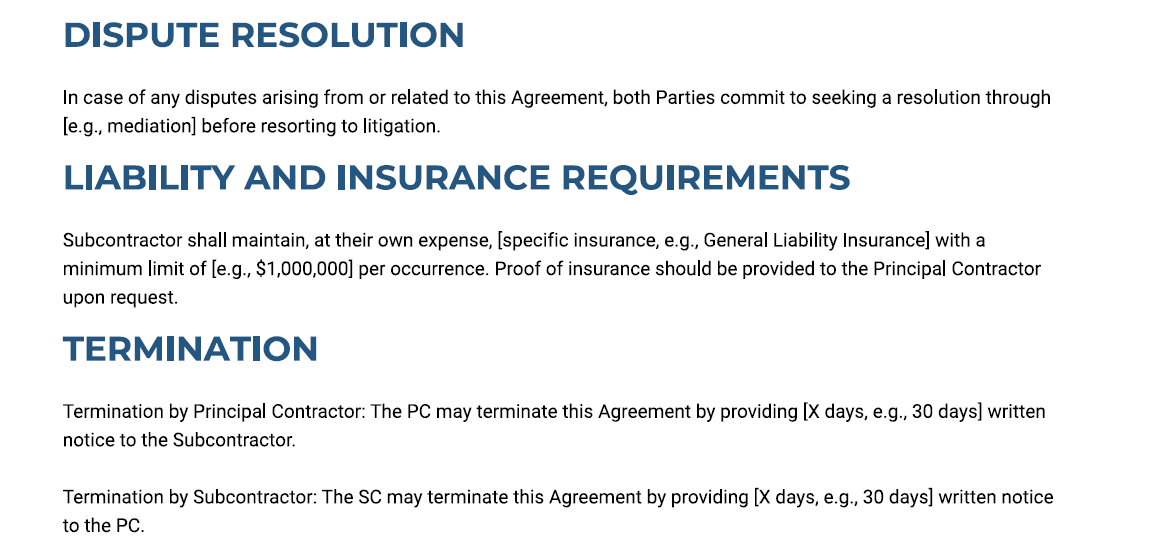
Legal considerations should include:
Insurance and licensure: Set subcontractor requirements and warranties, including proper certificates of insurance, licenses, and permits.
Some contracts specify that the subcontractor isn’t entitled to workers’ compensation or other employee benefits.
Indemnification: Specifies one party will compensate the other party for damages on the job site, omissions, or losses resulting from the subcontractor’s work.
Waivers and severability: A waiver due to a breach, default, delay, or omission of provisions in the agreement allows a party to relinquish a legal right or claim if one party doesn’t follow through with the contract.
Severability allows the contract to remain effective even if one part is found legally unenforceable.
Consider consulting a legal professional to ensure your subcontractor cleaning service contract meets the requirements of applicable laws and local ordinances since contract laws vary by state.
What are common payment terms for subcontractor agreements?
Subcontractor payment terms for commercial or residential cleaning depend on how the cleaning company pays subcontractors. Defining payment terms upfront eliminates potential misunderstandings.
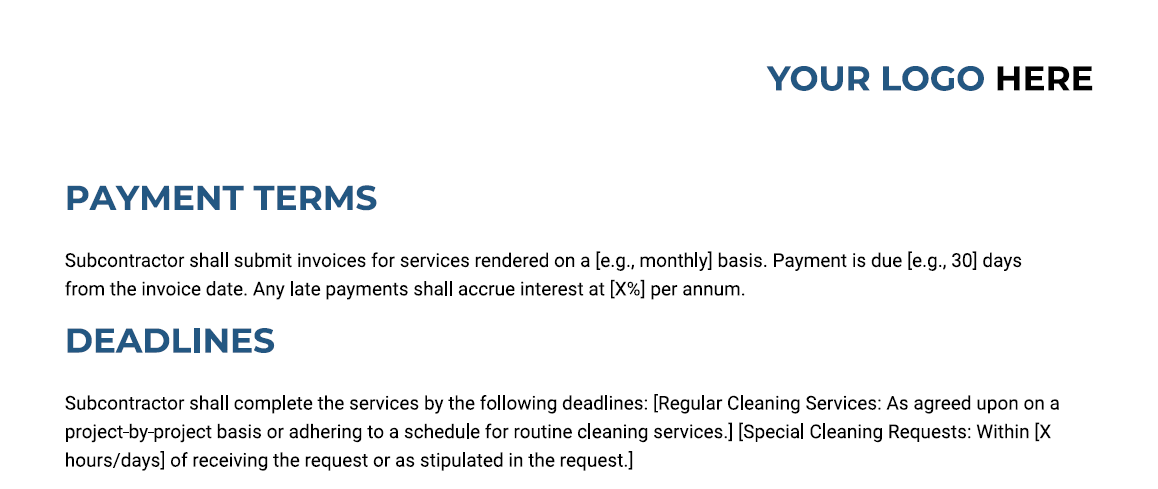
Common payment terms include:
Fixed price: The subcontractor agreement sets a fixed price for the cleaning service job. Before specifying a price, the company needs to perform workloading to determine how long it will take to clean the space based on square footage and types of cleaning services.
Periodic fixed price: Similar to a fixed price, the company pays a recurring flat fee to the subcontractor weekly, biweekly, or monthly.
Hourly rate: The cleaning company pays an hourly rate to the subcontractor. In this scenario, the subcontractor submits an invoice, and the company pays within a specific time.
Some cleaning businesses may implement retainage or deposits as part of the payment method, holding back a certain amount of money to ensure satisfactory job completion.
How to determine the scope of work for a cleaning services agreement
A clear and comprehensive scope of work helps clarify the details of the cleaning job. Use concise language and include as many details as possible about the job, including cleaning tasks and frequency.
Once you’ve met with the client, you’ll know what cleaning services they need and how often they want cleaning performed.
To create a well-defined scope of work, follow these tips:
Use detailed descriptions: Clearly state which tasks the subcontractor must perform in which facilities or areas, such as dusting, vacuuming, carpet cleaning, and mopping. The more details, the better.
Establish a schedule: Set a cleaning schedule for the frequency of cleanings, whether every day, every other day, or every week. Include when the subcontractor should clean within certain times or after business hours. The schedule should also outline processes surrounding the cancellation of services.
Set quality control standards: Define your company standards and expectations. Cleaning companies with Aspire janitorial business management software gain increased visibility through a subcontractor portal, which allows subcontractors to manage and report work to your company.
Follow best practices to improve your subcontractor agreements and create a long-lasting partnership.
Best practices for drafting a janitorial subcontractor agreement
When customizing a janitorial subcontractor agreement template or creating your contract, follow best practices to include essential elements and provide proper legal protection for your company.
Obtain legal advice: Consult a business law professional for proper wording and other legal considerations, such as how to handle confidential information. Contract laws vary by state, and you’ll want to protect your company and clients fully.
Consider negotiation: Since a subcontractor works with your company, treating the relationship as a growing partnership is essential. This may mean negotiating on price or other elements in the contract.
Review routinely: Regularly reviewing contract agreements ensures they’re up-to-date with your business processes and current laws. Regular review allows you to revise as costs fluctuate or your business processes change.
Janitorial businesses that implement best industry practices better protect their businesses and drive growth.
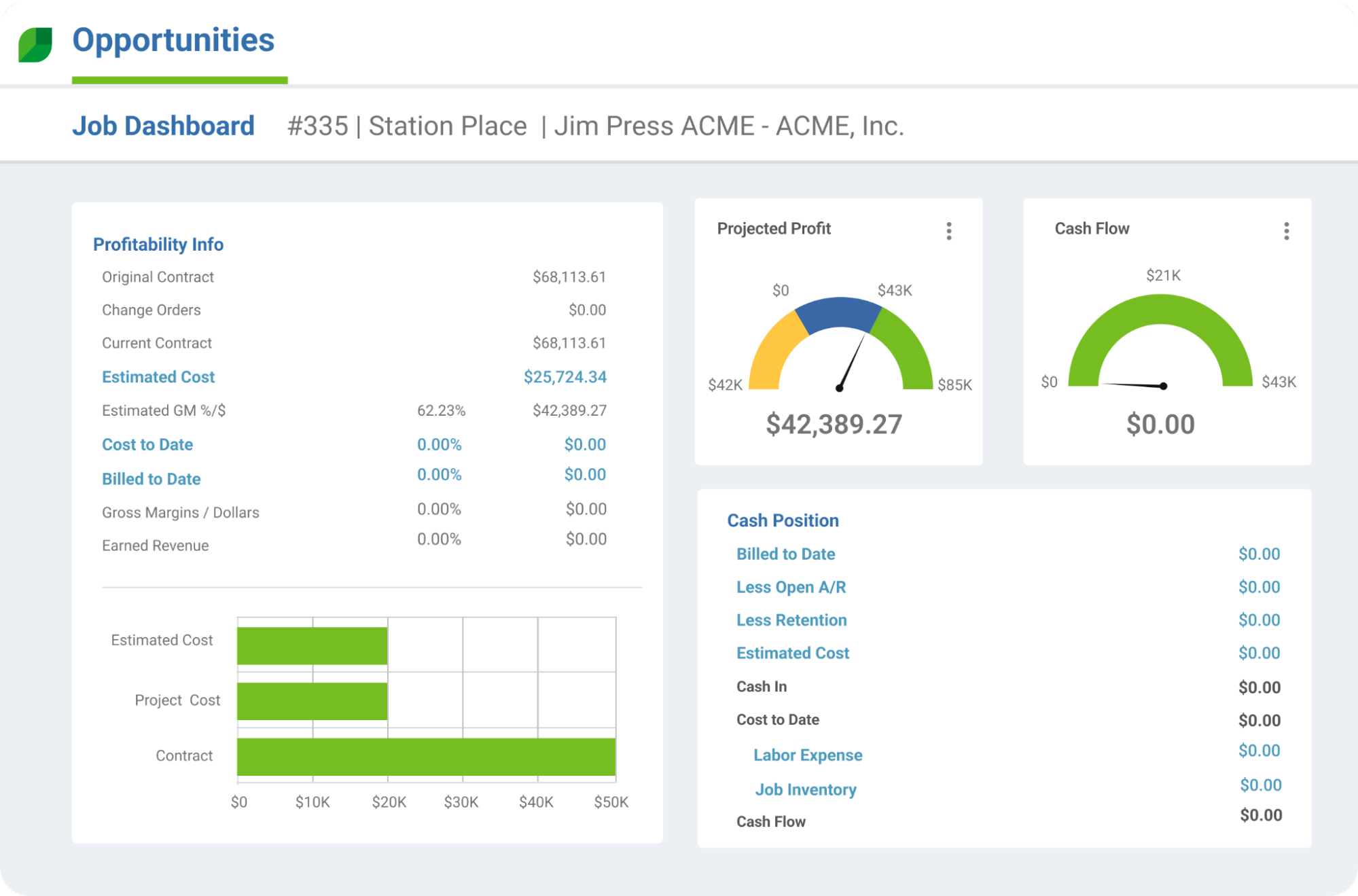
Streamline and optimize to boost your cleaning business profit margins
Complete visibility is the key to efficient operational management, no matter how many janitorial subcontractors you work with.
Aspire cleaning business management software provides real-time data into every aspect of your operations, including:
Estimating
Scheduling and routing
Crew management
Time tracking
Job costing
Aspire’s comprehensive platform empowers janitorial and commercial cleaning contractors to take control of labor and job costs, optimize operations, and make more profitable business decisions.
See how Aspire boosts business growth. Schedule a demo today.








